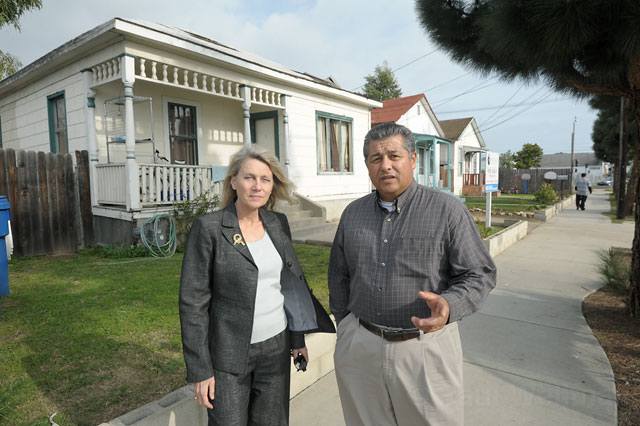Plug Pulled on Redevelopment Agency
City Officials Scramble to Figure Out What They Can No Longer Do

No one played taps; no flags flew at half-mast. But as of Tuesday afternoon, the State of California effectively took one of the City of Santa Barbara’s prized cash cows out behind a barn and shot it. The city’s Redevelopment Agency — first hatched in 1972 — is officially no more, an unintended fatality in a high-stakes power struggle between California’s cities and the state’s cash-starved Legislature. The governor and Legislature intended merely to pilfer the redevelopment agencies’ collective bank accounts to the tune of $1.7 billion, not to eliminate the legal basis that gave rise to the 400 agencies that have burgeoned throughout the state since the end of World War II to fight blight real and imaginary.
Gone in this accidental carnage will be the $36 million City Hall would have accrued in property taxes over the next three years; gone will be any new funding for any new affordable-housing projects, any new art projects, or any other projects the agency might undertake in hopes of revitalizing Santa Barbara’s downtown retail core. Uncertain is the fate of about $40 million that the Redevelopment Agency officials have managed to squirrel away over the years in various savings accounts. Equally uncertain are about $80 million in various commitments that City Hall executives contend are legally binding and, hence, beyond the Legislature’s grasp.
Certain projects, the councilmembers were told, will definitely be funded to fruition. These include the west downtown lighting project, plus the construction of two new public restrooms, one at Pershing Park and the other at Plaza del Mar. It would make no sense, they were told, if the Redevelopment Agency would not be allowed to finish projects it’s already spent millions to start. In that vein, the Redevelopment Agency has already contributed $2 million so that Peoples’ Self-Help Housing could acquire a parcel of land at Salinas and Haley streets; it has another $2.3 million on hand to help get the 50 new units of affordable rental units constructed. More iffy is the $8 million in agency funds the council contends has been committed to the construction of a new police station. All in all, the council embraced a wish list of such legal commitments worth $142 million. To the extent that wish list will be legally honored will depend entirely upon a new superagency of rival local governments that has yet to be created. The rules governing how that agency resolves disputes over these claims remain unwritten.
Redevelopment critics contend the agencies siphon off property taxes that could — and should — go to school districts and counties. Councilmember Cathy Murillo sought to make this case at the City Council meeting, insisting there must be “a silver lining” to the “black hole” described by city staff. Community Development chief Paul Casey countered that in the short term, the State Legislature would use the additional revenues only to defray some of the cuts that would otherwise afflict schools, not increase school funding. Councilmember Dale Francisco acknowledged there’s abuse in some redevelopment agencies, but insisted that Santa Barbara’s has been “exemplary.” He expressed outrage that the state saw fit to raid Santa Barbara’s rather than deal with its own “perpetual fiscal irresponsibility.” Grant House expressed pride in all the things Santa Barbara’s agency had accomplished over the years, and Mayor Helene Schneider noted ruefully a TV show’s last episode is typically accompanied by some “montage.”
That montage, said Brian Bosse — a high-ranking administrator with Santa Barbara’s agency — should include the expansion of Chase Palm Park and the new railroad depot. It should include Paseo Nuevo and about 3,700 units of affordable housing that were built with assistance from the Redevelopment Agency. Bosse has spent the past 12 years working for the agency, and he and nine other redevelopment employees will soon have to find new jobs within the city bureaucracy or be out of work. He said he spent part of Monday on a conference call with about 200 city attorneys from around the state trying to figure out what happens next. “I think my studies on the big bang theory back in eighth grade had more answers,” he said.



